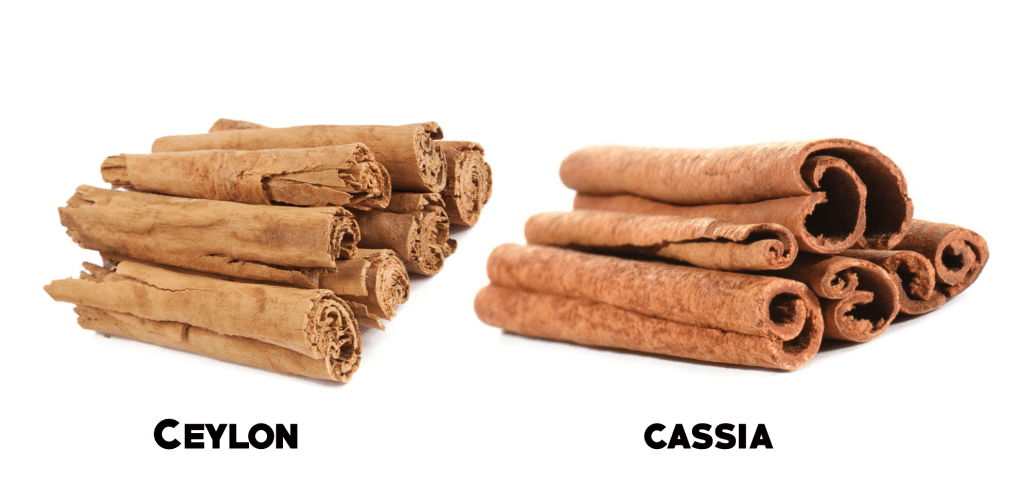Cinnamon is a beloved spice utilized for centuries due to its unique flavor and various health benefits. However, many people are unaware that different types of cinnamon are available on the market, with Ceylon cinnamon often regarded as the premium variety.

This article will explore the distinctions between cinnamon and Ceylon cinnamon, shedding light on their characteristics, origins, and potential health advantages. By understanding the differences, you can make an informed choice when selecting the ideal cinnamon for your culinary and wellness needs.
What is Cinnamon?
Cinnamon is a spice derived from the bark of trees belonging to the Cinnamomum genus. It is widely used in cooking and baking, adding warmth and depth to various dishes. The most commonly available cinnamon is Cassia or Chinese cinnamon (Cinnamomum cassia) from China and other parts of Asia. It possesses a robust and spicy flavor and is often used in savory dishes.

Introduction to Ceylon Cinnamon
Ceylon cinnamon, scientifically known as Cinnamomum verum or “true cinnamon,” is a premium variety highly prized for its delicate flavor and aroma. It is native to Sri Lanka (formerly Ceylon), Madagascar, and the Seychelles. Ceylon cinnamon is derived from the inner bark of the Cinnamomum verum tree and is known for its sweeter and more subtle taste than Cassia cinnamon.
Flavor and Aroma
One of the primary distinctions between cinnamon and Ceylon cinnamon is their flavor profiles. Cassia cinnamon offers a strong, robust taste with a hint of spiciness, making it suitable for heartier dishes, such as curries or stews. On the other hand, Ceylon cinnamon has a milder and slightly sweeter flavor, making it ideal for delicate desserts, baked goods, and beverages.

Its fragrance is more complex, with subtle citrusy and floral notes, adding a sophisticated touch to culinary creations.
The Miraculous Power of Cinnamon: Lowering Cholesterol Levels Naturally
Coumarin Content
Another crucial factor to consider when comparing cinnamon and Ceylon cinnamon is their coumarin content. Coumarin is a naturally occurring compound found in some plants, including cinnamon. In high doses, it may have adverse effects on the liver and cause health concerns. Cassia cinnamon contains higher levels of coumarin compared to Ceylon cinnamon.
Therefore, if you consume cinnamon frequently or in large amounts, choosing Ceylon cinnamon may be a better choice to minimize potential health risks.
Medicinal Properties
Both cinnamon and Ceylon cinnamon possess medicinal properties, but Ceylon cinnamon is often considered to have a slight edge due to its lower coumarin content. Cinnamon, in general, is known for its anti-inflammatory, antioxidant, and antimicrobial properties. It has potential benefits such as improving blood sugar control, reducing cholesterol levels, and aiding digestion.
Ceylon cinnamon, in particular, has been studied for its potential antidiabetic effects. It may help enhance insulin sensitivity and lower blood sugar levels, benefitting individuals with diabetes or those at risk. Additionally, Ceylon cinnamon may have more robust antimicrobial properties, making it potentially helpful in fighting bacterial and fungal infections.
Culinary Applications and Pairings
Both cinnamon and Ceylon cinnamon are widely used in various culinary applications. Cassia cinnamon’s intense flavor and aroma make it famous for hearty dishes, spiced beverages, and savory sauces.

Ceylon cinnamon’s delicate taste and aroma lend themselves well to desserts, pastries, and lighter dishes, such as fruit salads or oatmeal. It is also commonly used in chai tea and mulled wines for its aromatic qualities.
Conclusion
Cinnamon and Ceylon cinnamon are two distinct varieties with different flavor profiles, origins, and health implications. Cassia cinnamon offers a robust and spicier flavor, while Ceylon cinnamon boasts a milder, sweeter taste with subtle citrus and floral undertones. Ceylon cinnamon, being lower in coumarin, may be a safer choice for individuals who consume cinnamon regularly or in large quantities.
Moreover, Ceylon cinnamon has shown promise in specific medicinal applications, particularly in blood sugar control and antimicrobial properties. When selecting between the two, consider your culinary preferences and potential health concerns to determine which variety suits your needs best.
Recommended Reading
The Miraculous Power of Cinnamon: Lowering Cholesterol Levels Naturally
